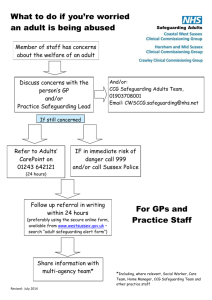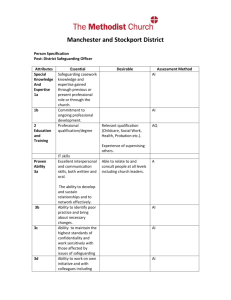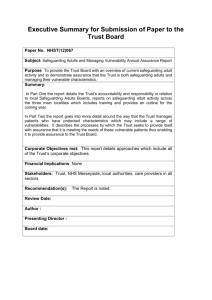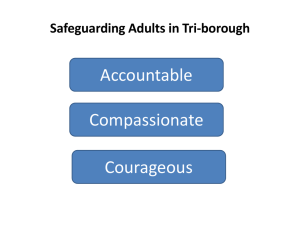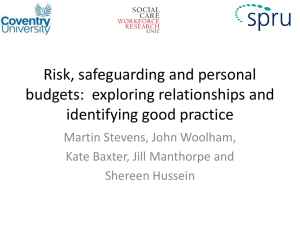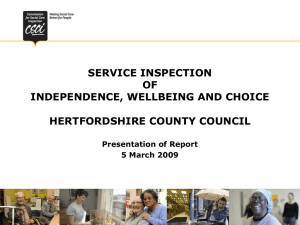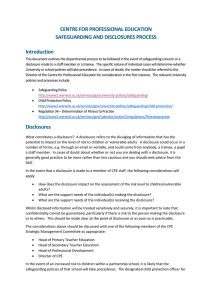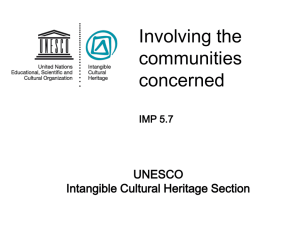What's left in adult social work?
advertisement
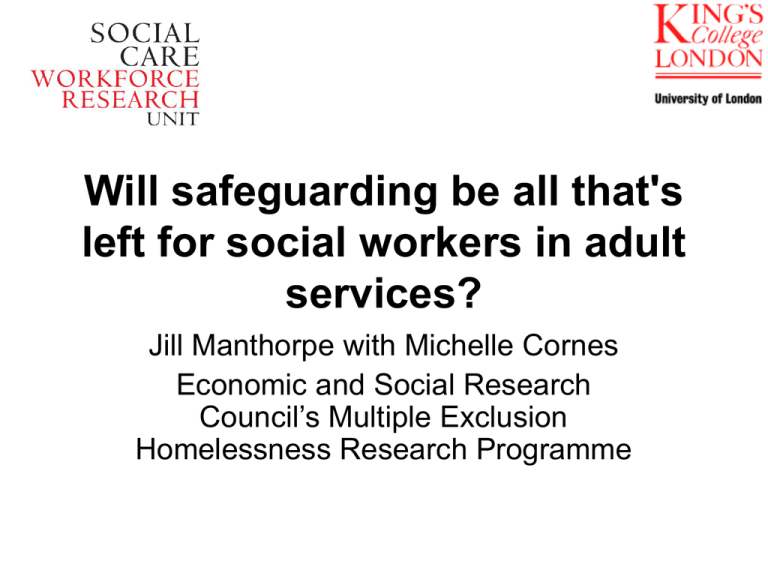
Will safeguarding be all that's left for social workers in adult services? Jill Manthorpe with Michelle Cornes Economic and Social Research Council’s Multiple Exclusion Homelessness Research Programme Adult social work – the end of the line? Or old wine – new bottles? • Scenario 1: children/adult separation remains but more interagency + NHS work • Scenario 2: export from LA to 3rd + private sectors • Scenario 3: no real change • Scenario 4: joins chimney sweeps, gas lighters, coal miners, bus conductors, knife sharpeners… The inverse user law • Over half of newly qualified social workers work in children’s services • Around one in seven with older people • Around one in ten working in services for people with mental health problems (WallisJones & Lyons, 2002). • Most graduates start in child protection Fine words butter no parsnips? ‘We therefore emphasise the role that skilled social work will continue to play in assessing the needs of people with complex problems and in developing constructive relationships with people who need long-term support’. (Secretary of State for Health, 2005, 10) The (old) Vision ‘Social workers spending less time on assessment and more on support, brokerage and advocacy.’ (HM Government, 2007, 3) The (new) Vision Reinforced social workers’ continued role in assessing and planning care but sees the potential for new roles in advocacy, brokerage and more therapeutic work. (Department of Health, Association of Directors of Adult Social Services (ADASS), British Association of Social Workers (BASW), & Social Care Association (SCA) 2010) Will the Law Commission rescue social work? Assessment as appropriate - people not SW title • A specialist assessment - such as for people with severe and enduring mental health problems, people with borderline mental capacity or those with dual diagnoses. (5.86) • Recommendation 14: The code of practice should provide guidance on when it would be appropriate for a local authority to authorise other individuals or bodies to carry out an assessment, or aspects of an assessment, and what degree of oversight should be provided by the local authority. • Recommendation 15: The statute should include a clear statement to the effect that a local authority can carry out a community care assessment at the same time as any other assessment is carried out. • No greater role in safeguarding Turning to employers – what they want social workers to do? ‘Feedback from employers, practitioners, practice assessors, and from independent research strongly suggests that there are certain areas of knowledge and skills which are not being covered to the right depth in social work initial training. These include: assessment frameworks; risk analysis; communication skills; managing conflict and hostility; working with other professionals. An understanding of the research, legislation and policy basis for practice is also essential…’ (Social Work Task Force, 2009a, para 1.19) Time for some focus What will adult social workers do? 1) Rationing • Moderate: Bradford, Calderdale, Doncaster, N Lincs, NE Lincs, N Yorks, York • Substantial: Barnsley, Hull, Rotherham, Sheffield, Leeds (both Kirkless & Birmingham legal challenge about move to Critical) • Upper Substantial: East Riding Not the P word ‘Social workers may well find themselves at the forefront of implementing a policy with potential for considerable improvements in people’s lives in a context that undermines its capacity for success’. (Netten et al) But rationing is not just denial… integration • Hudson (2010) sees adult social care as the ‘handmaiden’ of the NHS with a consequent loss of distinct perspective. • But huge opportunities eg with Multiply Excluded Homeless and in Safeguarding 2) Managing complexity • Bob’s story • New roles in housing & homelessness; mental health & substance misuse • Crises and complications Managing conflict • Who else will perform safeguarding? • Who is legally literate? • Who is up for case management? And finally… • Ensuring the College is adult oriented • Maintaining the point to registration (HPC) • Expecting to manage • Alert to new arenas eg human trafficking • Addressing ‘care poverty’ In other words - watchful waiting
